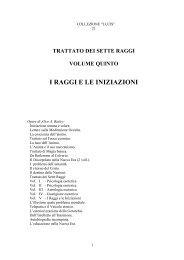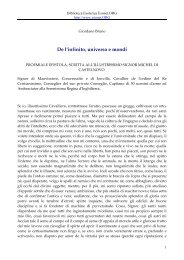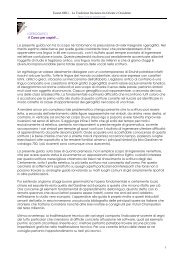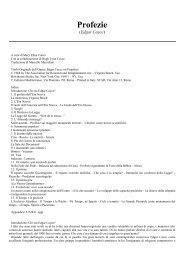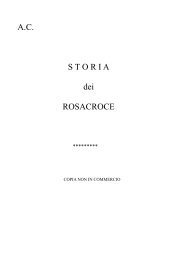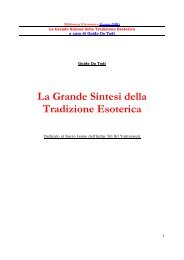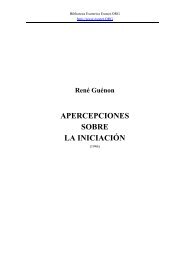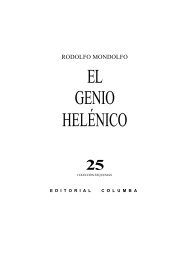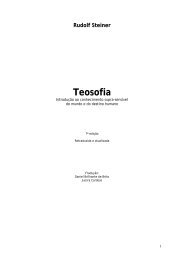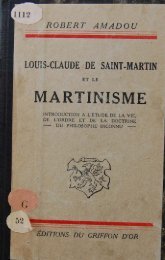Biblioteca Esoterica Esonet.ORG http://www.esonet.ORG 1
Biblioteca Esoterica Esonet.ORG http://www.esonet.ORG 1
Biblioteca Esoterica Esonet.ORG http://www.esonet.ORG 1
You also want an ePaper? Increase the reach of your titles
YUMPU automatically turns print PDFs into web optimized ePapers that Google loves.
<strong>Biblioteca</strong> <strong>Esoterica</strong> <strong>Esonet</strong>.<strong>ORG</strong><br />
<strong>http</strong>://<strong>www</strong>.<strong>esonet</strong>.<strong>ORG</strong><br />
stability and unvarying fixity "there could be [no] certainty in existence" begs the question:<br />
why should there be "certainty in existence"? The answer is obvious: man needs certainty<br />
in order to feel secure.<br />
Sri Aurobindo, however, apparently did not envision such a psychological answer, nor<br />
did his predecessors in the Vedanta. Indian metaphysics and philosophy relied instead on<br />
the testimonies and discoveries of a long series of great yogis who claimed to have found a<br />
method for experiencing this absolute unity, stability, and changelessness as the ground<br />
of all existence, Brahman, "the One and Absolute... which alone is." Sri Aurobindo goes on<br />
to state that "if there is no reality but Brahman, the phenomenal Universe, which is<br />
obviously a manifestation of something permanent and eternal, must be a manifestation<br />
of Brahman and of nothing else." 11 Brahman manifests in different ways at each of three<br />
fundamental levels of being (or Universes). For man, Brahman manifests as the Supreme<br />
Self who is identical with the transcendent Self in all human beings, atman.<br />
The Upanishads tell us that Brahman is not a blind universal Force working by its very<br />
nature mechanically, nor even an unconscious Cause of Force; He is conscious or rather is<br />
Himself Consciousness, cit, as well as sat [Being)...the wider knowledge of the Universe<br />
attainable to Yoga actually does reveal such a Universal Intelligence everywhere at work.<br />
Brahman, then, is Consciousness, and this once conceded, it follows that He must be in His<br />
transcendent reality Absolute Consciousness. His Consciousness is from itself and of itself<br />
like His existence, because there is nothing separate and other than Him; not only so but it<br />
does not consist in the knowledge of one part of Himself by another, or of His parts by His<br />
whole, since His transcendental existence is one and simple, without parts. His<br />
consciousness therefore does not proceed by the same laws as our consciousness, does not<br />
proceed by differentiating subject from object, knower from known, but simply is, by its<br />
own right of pure and unqualified existence, eternally and illimitably, in a way impure<br />
and qualified existences cannot conceive. 12<br />
Such metaphysical conceptions, which Aurobindo develops eloquently and logically, are<br />
based, I repeat, on premises believed to be incontrovertible: "reason demands" them;<br />
without them there would be no "certainty in existence"; and experiences of the great<br />
Yogis (and of Aurobindo himself) prove them absolutely true. But my question is: Can one<br />
speak of truth if one does not ask, for whom? The Hindu philosopher realizes that there<br />
are basic levels of existence and consciousness, that what seems separate at one level may<br />
be seen united at another. The Vedanta states that "identity is a fact in the reality of things,<br />
the world of phenomena." 13 Human consciousness, however, is said to be able to evolve<br />
from the realm of appearances to that of reality. The problem is: Why should one give to<br />
this kind of reality an absolutely positive meaning? Must we give to any experience a<br />
character of absolute validity or accuracy? Moreover, what actually is meant by<br />
Consciousness and especially Absolute Consciousness?<br />
11 op. cit., p. 10.<br />
12 op. cit., pp. 18f.<br />
13 op. cit., p. 11.<br />
21



